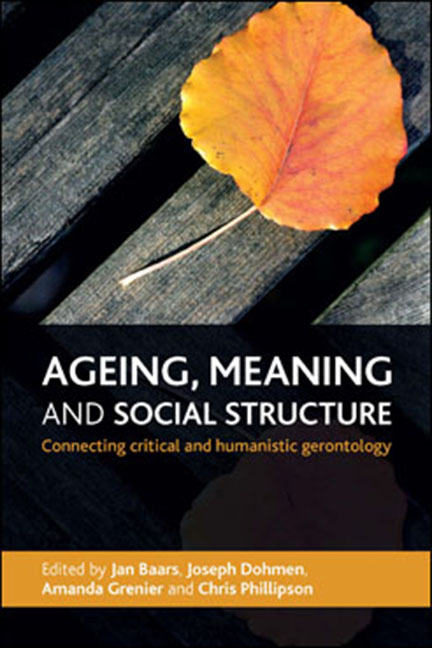Book contents
- Frontmatter
- Contents
- Notes on contributors
- Acknowledgements
- one Introduction
- two Connecting meaning with social structure: theoretical foundations
- three My own life: ethics, ageing and lifestyle
- four Rethinking agency in late life: structural and interpretive approaches
- five Dementia: beyond structures of medicalisation and cultural neglect
- six Self-realisation and ageing: a spiritual perspective
- seven Social ability or social frailty? The balance between autonomy and connectedness in the lives of older people
- eight Critical perspectives on social work with older people
- nine Community-based participatory action research: opportunities and challenges for critical gerontology
- ten Commentary: contingent ageing, naturalisation and some rays of intellectual hope
- Index
nine - Community-based participatory action research: opportunities and challenges for critical gerontology
Published online by Cambridge University Press: 07 September 2022
- Frontmatter
- Contents
- Notes on contributors
- Acknowledgements
- one Introduction
- two Connecting meaning with social structure: theoretical foundations
- three My own life: ethics, ageing and lifestyle
- four Rethinking agency in late life: structural and interpretive approaches
- five Dementia: beyond structures of medicalisation and cultural neglect
- six Self-realisation and ageing: a spiritual perspective
- seven Social ability or social frailty? The balance between autonomy and connectedness in the lives of older people
- eight Critical perspectives on social work with older people
- nine Community-based participatory action research: opportunities and challenges for critical gerontology
- ten Commentary: contingent ageing, naturalisation and some rays of intellectual hope
- Index
Summary
Introduction
Critical gerontology has evolved from a commitment by researchers to challenge and ultimately change the ways in which Western societies construct ageing and shape the lives of older people (Phillipson and Walker, 1987). This value-based approach is founded on critical gerontologists’ ethical engagement with concerns of social justice and equity across the lifecourse and, particularly, as they relate to later life (Holstein and Minkler, 2003). In addition, researchers working within the critical tradition refer to the existence of a moral obligation to change the ways in which societies construct the cultural, economic and political parameters that frame the ageing of an increasingly diverse group of citizens (Phillipson and Walker, 1987; Martinson and Minkler, 2006). There are, of course, a variety of ways in which researchers can attempt to bring about social change. As a result, the targets of critical approaches in gerontology range from national and international policy making to those who live and work in local communities.
The value base associated with a critical approach influences not only the substantive themes of research in critical gerontology, but also helps to shape the methodological approaches adopted in empirical studies. In recent years, driven by a commitment to bring about social change, critical gerontologists have increasingly engaged with participatory or participative methods of doing research (Martinson and Minkler, 2006; Blair and Minkler, 2009). This represents part of a broader shift in Western societies to engage older people in the production and dissemination of gerontological knowledge and in the development of policy and practice (Godfrey et al, 2004; Hennessy and Walker, 2011).
Increasingly, older people have themselves been supported to develop their own expertise in research and thereby assume responsibility for the entire research process (Glanz and Neikrug, 1997; Clough et al, 2006; Cornes et al, 2008). In essence, proponents of a more participatory approach argue that older people's direct involvement in research processes can lead to the empowerment of otherwise marginalised or socially excluded groups. Rather than targeting structural change at the potentially remote level of national or international policy processes, participatory methods can lead to social change in ways that are more meaningful for ageing adults (Blair and Minkler, 2009).
- Type
- Chapter
- Information
- Ageing, Meaning and Social StructureConnecting Critical and Humanistic Gerontology, pp. 157 - 180Publisher: Bristol University PressPrint publication year: 2013
- 1
- Cited by

